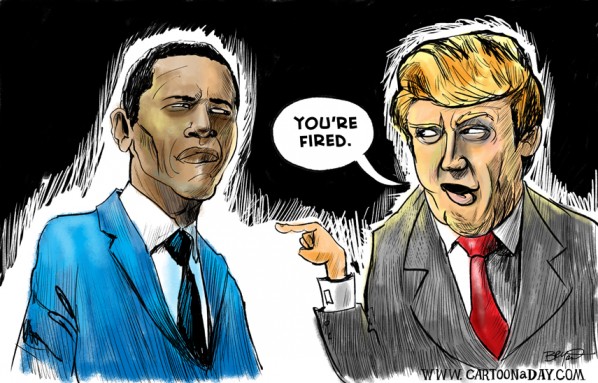Above the Law
By Richard W. Rahn

What recourse does a citizen have when government employees violate the law and do harm, and then they are protected by the government? Government was created to protect person and property and ensure liberty, but it has increasingly become the abuser rather than the protector.
In all too many cases, asset forfeiture laws have resulted in totally innocent individuals having their money or other assets taken from them by federal, state or local law enforcement officials even though they have not been convicted of any crime.
Trump’s Real Problem
By David Boaz

Donald Trump has shot to the top of Republican presidential polls on the strength of his celebrity and his bombastic talk.
Elites on all sides of the political spectrum — liberals, conservatives, and libertarians — are horrified by his ranting about Mexican “rapists.” And he may have shot himself in the foot with his comments about Senator John McCain. But his poll numbers are still up there.
Promoting Very Unsettled Science
By Richard W. Rahn

If you have been to the beach at Treasure Island, Florida (adjoining St. Petersburg), you will notice something very odd. The hotels (many of which were built in the 1950s and ‘60s) and the seawall are very far from the water in the Gulf of Mexico — giving an extraordinarily wide beach. It was not always that way. When the hotels and seawall were built, they were set back from the high tide a normal hundred yards or so; but over the years, there was a natural but unforeseen accretion to the beach — which, having grown up in the area, I observed. (It can be seen on Google Earth.)
Note to Greece: Mixing Currency and Politics Doesn’t Work
By George Selgin

Greece’s monetary troubles have dominated the headlines now for weeks, releasing a torrent of analysis assigning blame or proposing solutions. Yet that torrent overlooks the bigger tragedy in which the recent Greek drama is but the latest act: governments’ misuse of currency as a tool of politics.
What currency is meant to do—and how the euro betrays that purpose
Ask any competent economist what currency is and he or she will tell you that it’s a generally accepted medium of exchange meant to overcome the difficulties of barter. A specialist might go on to explain how certain currency systems do a better job of facilitating exchange and of avoiding financial crises than others. Few would think of currency as a tool of politics.
Coercion Is Bad Economics
By Chris Edwards

A common feature of Obama administration economic policies is the use of government coercion. The Obamacare health law mandated that individuals buy insurance. The administration’s tax increases grabbed more earnings from millions of people. And federal agencies are imposing an increasing pile of labor, environmental, and financial regulations on businesses.
Pro-market policy experts point out the negative effects of each intervention, but the administration keeps dreaming up with new ways to take our money, restrict what we do, and manipulate the economy.
Jeb Bush’s Advice: Work Harder, Not Smarter
In a recent interview, Jeb Bush said that in order for the United States to reach a higher level of economic growth, “people need to work longer hours.”
Leftists immediately jumped on this comment as proof that Bush is horribly out of touch with ordinary working Americans.
Bush soon backtracked and attempted to explain that what he really meant was that there are too many people working fewer hours than they would like. In other words, Bush explained, work force participation is too low for a society in which many people would in fact like more gainful employment.
Leftists immediately jumped on this comment as proof that Bush is horribly out of touch with ordinary working Americans.
Bush soon backtracked and attempted to explain that what he really meant was that there are too many people working fewer hours than they would like. In other words, Bush explained, work force participation is too low for a society in which many people would in fact like more gainful employment.
Central Banks and Our Dysfunctional Gold Markets
Many investors still view gold as a safe-haven investment, but there remains much confusion regarding the extent to which the gold market is vulnerable to manipulation through short-term rigged market trades, and long-arm central bank interventions. First, it remains unclear whether or not much of the gold that is being sold as shares and in certificates actually exists. Second, paper gold can theoretically be printed into infinity just like regular currency — although private-sector paper-gold sellers have considerably less leeway in this regard than central banks. Third, new electronic gold pricing — replacing, as of this past February, the traditional five-bank phone-call of the London Gold Fix in place since 1919 — has not necessarily proved a more trustworthy model. Fourth, there looms the specter of the central bank, particularly in the form of volume trading discounts that commodity exchanges offer them.
Immigrants Aren’t the Only Ones Who Shouldn’t Be Voting
Much
of the current immigration debate in the United States centers around
the issue of “amnesty,” which is a vague term that may mean anything
from “we won’t deport you” to “let’s fast-track you to citizenship and
voting rights.”
From a laissez-faire perspective, the deportation aspect of amnesty — an increase in federal inaction — is one thing. The extension of voting privileges, though, is something else entirely.
Indeed, the amnesty debate has helped to illustrate the difference between real, concrete property rights, and the much different political “rights” such as voting. Limiting property rights is always illegitimate. Limiting political rights, on the other hand, may sometimes be essential.
From a laissez-faire perspective, the deportation aspect of amnesty — an increase in federal inaction — is one thing. The extension of voting privileges, though, is something else entirely.
Indeed, the amnesty debate has helped to illustrate the difference between real, concrete property rights, and the much different political “rights” such as voting. Limiting property rights is always illegitimate. Limiting political rights, on the other hand, may sometimes be essential.




No comments:
Post a Comment